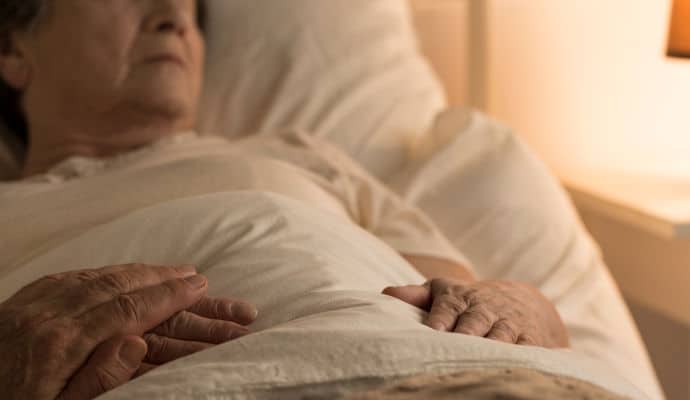Maintaining proper hygiene for bed-bound seniors is essential for their comfort, dignity, and health—yet it can be one of the most challenging aspects of caregiving. Limited mobility increases the risk of skin breakdown, infections, and discomfort, making a consistent hygiene routine crucial. With the proper techniques and tools, caregivers can transform this daily task into an opportunity for connection while preventing common complications.
In this article, we share six practical hygiene tips designed explicitly for bed-bound seniors, from gentle cleansing methods to pressure-relief strategies. These tips will help you provide compassionate care that protects physical and emotional well-being.

When someone is confined to bed due to health conditions, it’s essential to maintain personal hygiene. Feeling fresh and clean is necessary for physical and mental health. Transfer Master shares 6 tips for healthy personal hygiene when caring for someone who is bedbound.
Whether it’s caused by chronic illness, advanced age, disability, or injury, being bedridden comes with a variety of challenges, hygiene being one of the most important.
As a caregiver, assisting a bedbound older adult with personal hygiene helps them be as happy and healthy as possible.
Here are six tips for healthy personal hygiene when caring for someone who is bed-bound.
Six Hygiene Tips for Bed-Bound Seniors
1. Bathe Regularly
If patients cannot bathe themselves, you'll want to give them regular bed baths.
To give someone a bed bath, first gather these items:
- Bath towels, facecloths, and hand towels
- Soft sponges
- A bucket of warm water
- Gentle, non-irritating soap
- A washbasin
- Cotton buds or a nail brush
- Moisturizer
- Body powder (optional)
Next, start the bathing process:
- Place bath towels underneath your older adult to keep the bed dry.
- Use a moist hand towel or sponge to wash the eyes and face gently. Avoid using soap on the face, as it can irritate the skin.
- Roll down the sheet or blanket to expose their upper body. In general, try to expose only the body part you’re actively cleaning. Keep the rest of the body covered for warmth and modesty.
- Use another (clean, moist towel or sponge to clean the body. You may want to use a gentle body soap, but be aware that soap can cause skin irritation in some people.
- Clean their upper body, arms, and legs.
- Clean under and around their fingernails with a cotton bud or nail brush.
- Help them roll or turn as needed so you can thoroughly clean the patient's back, genitals, and buttocks area with a towel or sponge. Be sure to clean within any folds and then dry those areas thoroughly.
- Dip the patient's feet in a washbasin and clean them with a towel or sponge.
- Use moisturizer and body powder to keep their skin hydrated and dry, then change them into clean clothes.
Dry skin, especially if someone is prone to eczema, can cause infection.
So, it's essential to use a gentle, fragrance-free moisturizer, especially after bathing, to keep skin hydrated and soothe dry or itchy patches.
2. Keep Hair Clean
In addition to bathing, washing their hair regularly is a good practice.
In between washes, use a dry shampoo as needed to keep hair from getting greasy and uncomfortable. And try to do a thorough wash at least once a week, or more often if their hair gets especially grimy.
How to wash hair in bed:
- Place towels under the head and shoulders.
- Comb through their hair to remove tangles, then drape another towel over their shoulders. You could also use a hairstylist’s cape or something similar if available.
- If an older adult has a lot of hair, it may be easier to clip it into sections. Then use a spray bottle to wet the hair with warm water, and then shampoo. Work it in from the scalp upwards to the ends of the hair. Then, rinse the hair with a separate spray bottle of water.
- When all the hair is clean, wrap the head in a dry towel. Then use a hairdryer to gently dry the hair.
Watch this step-by-step video tutorial for washing someone’s hair in bed for more tips.
VIDEO: How to Wash Hair When Seniors Are In Bed
3. Trim Nails
Long or jagged nails can pose significant health risks, especially for older people.
Dirt and bacteria can get trapped under the nails and transfer to the skin when the patient touches or scratches themselves, potentially leading to infection.
Use a pair of nail clippers and a nail file regularly to keep nails trimmed and filed into a smooth, rounded shape.
Maintaining hygiene for bed-bound seniors isn’t just about cleanliness—it’s a critical part of preventing infections, pressure ulcers, and maintaining dignity. Simple daily routines, like gentle sponge baths and proper skin checks, can significantly improve quality of life while reducing hospitalizations.
— Dr. Jane Smith, Geriatric Nurse Practitioner and Director of the National Association for Caregiving
4. Change Bedding
People who aren't bedridden can usually get away with changing their bedding every week.
But when someone is bedridden, their bedding will likely need to be changed more often.
You might be surprised at how quickly bed linens can accumulate sweat, dead skin cells, hair, and food crumbs.
5. Brush Teeth After Meals
To keep teeth and gums healthy, help your older adult clean their mouth after each meal.
If possible, floss and rinse twice daily to remove any trapped food particles.
If you bring some people a toothbrush, toothpaste, floss, water, and a spit bucket, they may be able to handle these tasks independently.
VIDEO: 6 Hygiene Tips for Bed-Bound Seniors
6. Clean the Room
A messy environment can also be a hygiene risk.
Excessive dust can cause breathing difficulties, sneezing, itching, and throat discomfort. Unfinished food can also attract household pests.
Lastly, clutter can hurt someone’s mental and emotional well-being.
Keep their room comfortable and organized, and remove clutter from the floor.
Do your best to let in plenty of natural light, and regularly open the windows when possible to keep the air fresh.
By keeping your older adult and their room fresh and clean, you do much more than safeguard their physical health. You're also taking an essential step in helping them feel good.
Recommended for you:
- 9 Enjoyable Activities for Seniors with Limited Mobility
- How to Wash Hair for Someone Who Is Bedridden
- How to Help Someone with Alzheimer’s Brush Their Teeth
Guest contributor: Aaron Goldsmith owns Transfer Master, which has been building electric, adjustable hospital beds for home and medical facilities since 1993. He started with the simple goal that hospital beds should allow wheelchair users to transfer independently in and out of bed. Twenty-five years later, their customers are still at the center of everything they do.
About the Author

Connie is the founder of DailyCaring.com and was a hands-on caregiver for her grandmother for 20 years. (Grandma made it to 101 years old!) She knows how challenging, overwhelming, and all-consuming caring for an older adult can be. She also understands the importance of support, especially in the form of practical solutions, valuable resources, and self-care tips.














I have found that white vinegar helps tremendously in keeping skin soft without drying it out. The white vinegar comes in 2 different types – with chemicals and natural. Natural is of course the way to go. After washing I dry off then spray the white vinegar onto a paper towel and wipe my underarms, genitals, etc. I have a small “hanging belly” so I wipe very well under the fold. I do this a lot before the skin starts to bother. White vinegar is fantastic for this. Keeps me clean and dry.
Thanks for sharing your tip Jane!
Excellent tips! I have a helpful contribution related to washing the hair of a bed bound patient. I purchased an inflatable basin online which enables me to wash my mother’s hair thoroughly while in bed.
I place a waterproof bed pad under her shoulders and under the basin. I place a large stew pot on a pad on the floor, next to the bed. The drain tube from the inflatable basin sits in the pot. I gently put warm water over her hair and shampoo thoroughly. There is a drain plug in the basin, that when pulled allows the soapy water to drain into the pot. I then use fresh warm water to rinse and let the rinse water drain in the same way. I absolutely love this product!
Thank you for sharing your experience and helpful tips!
Similar to what you suggest, we’ve got an article about using a shampoo basin for an in-bed hair wash – How to Wash Hair for Someone Who Is Bedridden https://dailycaring.com/how-to-wash-your-seniors-hair-in-bed-video/